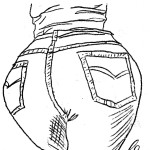- There are some people that buy into that old phrase “a jack of all trades is a master of none”, which is why my classmates and I were disheartened one day when we realized, in a Naturopathic Principles class, that naturopathic doctors really don’t shine in any one modality.
For example, we are trained to give massages but not like Registered Massage Therapists who study massage exclusively for 2 years. We don’t receive 4 straight years of acupuncture training as a doctor of Chinese Medicine does. We don’t have as many in-class live homeopathy cases as Homeopaths do, we don’t know as much about nutrition as a Registered Dietitian or Registered Holistic Nutritionist, we don’t have as much training in botanical therapies as an Herbalist, aren’t as seasoned in lifestyle counselling as a trained psychotherapist and we only really get a taste of manipulation, which is nothing compared to how extensively a chiropractor is trained.
So, while I should probably be shutting my big mouth about all this, considering the fact I am training to become a naturopathic doctor and should really be blogging about how great NDs are, I have to admit that my classmates and I asked ourselves, “why see an ND?” Surely if what you are seeking is acupuncture, homeopathy, advice on botanical tinctures and supplements, counselling, nutritional advice or massage you can open up your Yellow Pages and find a practitioner that specializes in any one of those modalities. You shouldn’t have to bother with seeing an ND at all, right?
Great God, why am I shelling out $20,000 a year in tuition??!
After careful thought we came up with this: a naturopathic doctor works as a Primary Care provider. We are the “GP”s of natural, alternative medicine and serve as the gateway to a patient’s health. If you are experiencing shortness of breath and fatigue, what do you do? Do you visit a cardiologist? Maybe you have anemia. Or maybe it’s a fungus? Sweet Buddha, maybe it’s LUNG CANCER, better head straight to an oncologist! (You also wonder if you’re simply out of shape. Maybe deciding to train for a marathon in under a month was a little too ambitious of you). How do you decide where to go when experiencing a symptom that could indicate a problem with any number of bodily systems?
Easy, you go to your GP, or your primary care provider, to be evaluated.
He or she is trained to do the following:
- Provide you with preventive care and teach you healthy lifestyle choices
- Identify and treat your condition
- Assess the urgency of your medical problem and direct you to the best place for that care, if necessary
- Make referrals to specialists when necessary
As naturopaths, we are trained to identify the cause of the symptoms our patient experiences (through history taking, physical exam, diagnostic testing, and generating a list of differential diagnoses) and, because we are trained in the medical sciences, we are also able to understand the process of the disease a patient presents with. We know what is going on in the body and where we need to intervene. We create an individualized treatment plan by following a hierarchy of treatment options that interfere as little as possible with the body’s natural healing abilities.
Because we are extensively trained in our modalities we are able to administer treatment to our patients ourselves as well as take part in every step of the patient’s healing process. However, if necessary, we are also trained to recognize when the patient will fare better under the care of a more specialized practitioner (or even medical doctor) and are able to recommend a referral.
There is another saying: “everything looks like a nail to a hammer”, which means that every healthcare practitioner is under the bias that your condition can only be treated using their own treatment methods. For example, to an acupuncturist, your condition can only be treated by acupuncture, to a chiropractor, you are in need of spinal adjustment and a nutritionist will most likely see your problems as dietary. NDs can diagnose your condition taking into account your unique combination of symptoms, treating your whole person, and focussing on eliminating the cause of disease, using the least invasive therapies available.
Go NDs!







Thank you, Talia. Well written!
Regarding the comment about dietitians,
Naturopathic Doctors do not receive nearly the same amount of classroom- nor practical- hours that I dietitian does within the field of nutrition. A dietitian completes a four year science degree in nutrition then goes on to complete a 1 year dietetic internship in which he/she completes 11-12 placements in various hospitals, long term care facilities, outpatient clinics, and foodservice centres. Each placement requires a minimum of 240 hours. Many of those hours are spent in direct patient care, hospital rounds, and collaboration with other health professionals. I would not hesitate to say that dietetic interns see as many (if not more) patients than a 4th year intern does in a naturopathic clinic. However, dietitians have simply concentrated on only one modality- nutrition.
A senior thesis in fourth year of a nutrition degree alone is the equivalent in credit hours to an entire year of nutrition at a naturopathic college. Not to mention the more than 60 credit hours of nutrition specific courses a dietitian will take within those four years. That is approx 48 credit hours more- or five times greater- than a naturopathic student receives. We need not compare the Holistic Nutritionist program, which receives a 2 year correspondence diploma to the rigor, intensity, or amount of training that a dietitian or even naturopathic doctor receives.
However, I believe that the efficacious practice in nutrition does not come down to who has more hours of training or who is an ND vs RD. It comes down to who is more committed to the process of continual learning and implementation of nutrition-based research. Granted, I believe many dietitians fall short in this area, but all professions are at risk of this. One may criticize some dietitians for being ‘out of date’ on their research knowledge, but by the same token many other practitioners fall within the same trap: that the degree in which you pursue is terminal. I.e., there is no further education beyond graduation.
A truly great practitioner is one who continues to learn even 20 years out of school. When we accredit ourselves as the best and affirm the belief that we need no further honing of skills and knowledge we rapidly become out-dated in practice. To boast in having a higher education than an allied health professional is not only disrespectful and counter-productive to the trend of integrative healthcare and inter-professionalism but it is also a sign that a particular profession has quit looking forward (at advancements in health) and began looking in the rear-view mirror at what is believed to be the “less-educated”.
PS – I agree that Naturopathic medicine is gorged with exceptional mentors, knowledge, and potential that I could not find in dietetics alone. I certainly have my own frustrations about dietitians, and shortcomings within my own knowledge- which naturopathic medicine greatly enriches. However, dietitians are often nagged upon by other professions for much the same reason naturopathic doctors are- ignorance on behalf of what it means to be a naturopathic doctor (or dietitian for that matter).
Hey, Darren,
Thanks so much for posting! I apologize for the unwitting comment about RDs and appreciate the information that you gave about the profession. After reading it I have an increased respect for the amount of training RDs undergo and the knowledge that they have regarding nutrition and patient care. I guess, in essence, that was the point I was trying to get at with my post. Other healthcare professionals certainly have more training in each modality than a naturopathic has in all of them.
I completely agree with the statement that a great practitioner is a perpetual student and should never put down their books, claiming that they’ve had “enough” hours of education. Especially concerning the lack of hours naturopaths receive in each modality, it is important to continue teaching oneself and staying up-to-date with current information. (This all seems like pretty far into the future for us, to be honest, considering we’re still tinkering through school at this point!)
(I will actually change my comment about RDs, because I realize it was fairly ill-put and reflects a lack of education on my part)
Thanks again for the post!
Thanks for your gracious reply. I hope it didn’t come across as arrogant or mean. I agree with what you write otherwise. The only point I think with taking from it is that there are crappy NDs, crappy RDs, and crappy doctors- but not all RDs, NDs, or MDs are crappy. It is truly based on the dedication of each individual irrespective of their original training.
I certainly look forward to reading more articles written by you!